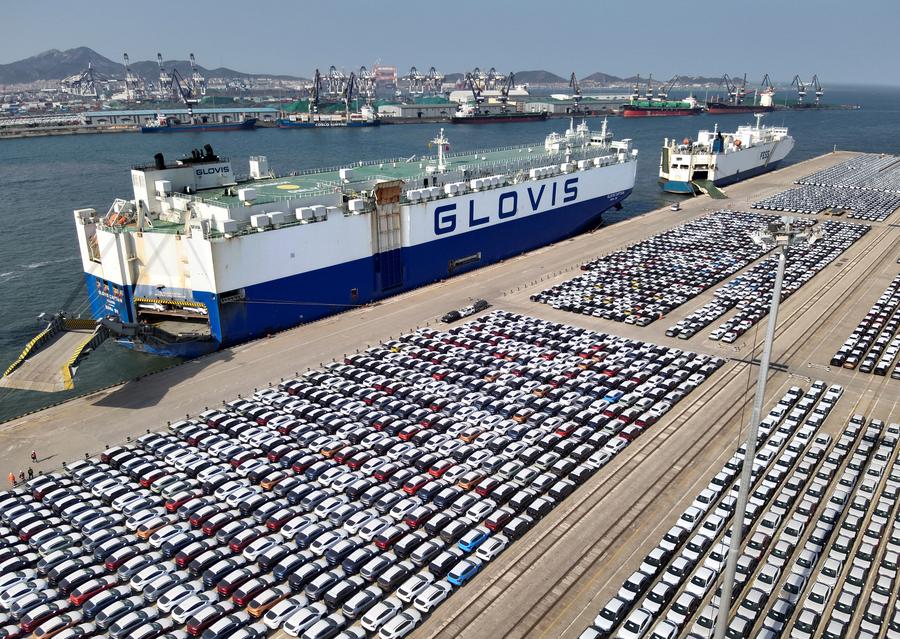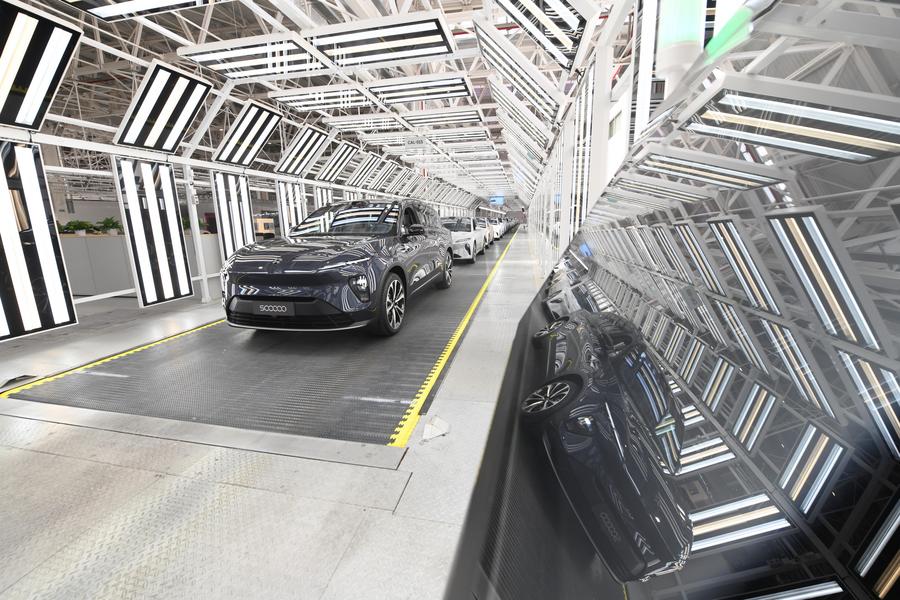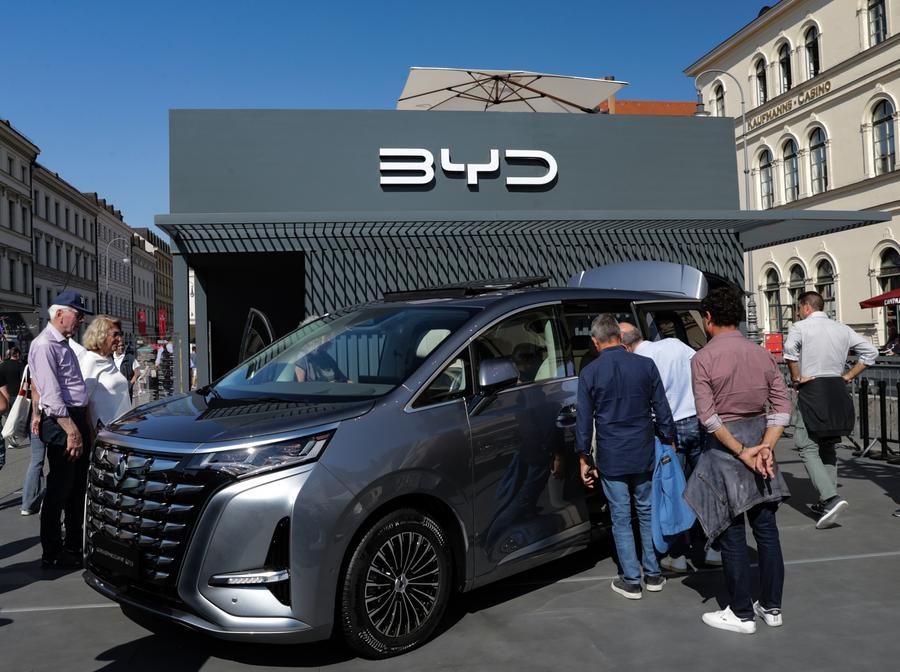European experts warn protectionism spells "disaster," "tragedy" for carmakers, consumers

An aerial drone photo taken on April 1, 2024 shows commodity vehicles to be loaded for export at Zhifu Bay Area of Yantai Port in east China's Shangdong Province. (Xinhua/Li Ziheng)
Increasingly, European policymakers and analysts recognize that Washington's claims of China's "overcapacity" in new energy disregard reality and economic principles.
FRANKFURT/ROME, May 29 (Xinhua) -- "Trade wars are all about losing, you can't win them," German Finance Minister Christian Lindner told reporters at the recently concluded meeting of Group of Seven (G7) finance ministers and central bank governors.
His remark represents an increasingly strong opposition from European leaders to U.S. protectionism.
Increasingly, European policymakers and analysts recognize that Washington's claims of China's "overcapacity" in new energy disregard reality and economic principles. Following Washington and imposing tariffs on Chinese electric vehicles (EVs) and other products would only harm European businesses, consumers and the fair competition environment in global trade.
"ABSURDITY" "DISASTER" "TRAGEDY"
Since U.S. President Joe Biden announced 100-percent tariffs on EVs and other products imported from China early this month, numerous European auto industry professionals, experts and scholars have warned that if the European Union (EU) follows suit, it will only harm the interests of its automakers and create a "tragedy" for its auto industry.
"Punitive tariffs are a disaster for the German car industry," said Ferdinand Dudenhoeffer, a renowned German expert on automotive economics and director of the Center for Automotive Research (CAR) in Bochum, Germany, warning against jumping on Washington's bandwagon.
Dudenhoeffer noted that the EU's anti-subsidy investigations and punitive tariffs will harm foreign automakers' interests, cause losses for international car manufacturers -- including European manufacturers -- and even slow down the electrification of the European auto industry.

This photo taken on May 9, 2024 shows NIO's 500,000th vehicle at the NIO Second Advanced Manufacturing Base in Hefei, east China's Anhui Province. (Xinhua/Zhang Duan)
"German carmakers would be hurt by tariffs from the EU. If you look at the carmakers and ask the CEOs or go to the suppliers, they all say, please don't do that. It will hurt our cooperation with China. It will hurt ourselves. So it's a tragedy for the German car industry," Dudenhoeffer added.
"The politicians are now calling for trade restrictions on Chinese car manufacturers. This is an absurdity," BMW CEO Oliver Zipse told German media Frankfurter Allgemeine Zeitung.
Proposing restrictions on EVs is short-sighted as it runs the risk of incurring countermeasures from trading partners, leading to a more difficult availability of essential raw materials for European EVs, said Zipse.
CEO of Stellantis Carlos Tavares said raising tariffs on Chinese electric vehicles is "a major trap for the countries that go on that path" and will not allow Western automakers to avoid restructuring to meet the challenge from lower-cost Chinese manufacturers.
Tavares added that tariffs would only fuel inflation in the regions where they are imposed, potentially impacting sales and production.

An aerial photo taken on Aug. 20, 2023 shows a view of Volkswagen (Anhui) Automotive Company Limited in Hefei, east China's Anhui Province. (Xinhua/Guo Chen)
CONSUMERS' NIGHTMARE
"What the EU must avoid are punitive tariffs! These would be the horror of the German car industry! EU punitive tariffs would lead to countermeasures by the Chinese government and place a massive burden on German manufacturers. China has been by far the most important sales market for all German car manufacturers for years," said Frank Schwope, automotive analyst at Norddeutsche Landesbank, on social media.
"For many customers, it's important that they can buy a car for 15,000 to 20,000 euros (16,200 to 21,600 U.S. dollars)" said Schwope in an interview with German business weekly Wirtschaftswoche. "The affordable electric car from China is something like the great hope of German citizens."
Dudenhoeffer said tariffs on China-made EVs will make European consumers pay. This is because Chinese competition in particular is currently driving local car manufacturers in the EU market to look for ways to produce cost-effective electric models. If this pressure no longer exists, it is likely to take much longer before a wide range of vehicles is available that can be financed by many consumers.

People visit the BYD booth at the 2023 International Motor Show, officially known as the IAA MOBILITY 2023, in Munich, Germany, Sept. 8, 2023. (Xinhua/Zhang Fan)
PROTECTIONISM TRAP
It has become increasingly clear to more European policymakers and analysts that the European Union should strengthen its cooperation with China rather than blindly following Washington's protectionist trade policies. As UK Chancellor of the Exchequer Jeremy Hunt has warned at the meeting of G7 finance ministers and central bank governors, "it is really important that the world does not unintentionally creep back into protectionism."
Alberto Bradanini, former Italian ambassador to China, called for European politicians to remain clear-headed, increase autonomy, and not be easily influenced by the United States.
"'Overcapacity' is an empty label. It is well known that China is not producing goods beyond the market's capacity to absorb," said Bradanini, now chairman of the Contemporary China Study Center in Italy. "The United States uses this as a pretext to initiate a trade war against China, which in itself is an act of trade protectionism."
He emphasized that China and Europe should strengthen cooperation despite U.S. pressure.
"We believe that building up new tariffs and sliding into protectionism is the wrong way to go; instead there should be more dialogue," said Hildegard Mueller, president of the German Association of the Automotive Industry (VDA).
Mueller regards the automotive cooperation between China and Germany in green transformation and intelligent connectivity as vitally important and encourages the two parties to continue to be crucial partners in achieving global climate goals.
"I believe that the two markets should be closely linked," she said, adding that Chinese companies are welcome in Germany. As for the German side, its carmakers have shown interest not only in exporting but also in producing in China, she noted.
The United States "ruthlessly follows an America First policy" and its tariffs against made-in-China EVs are "totally disproportionate, total protectionism," Michael Borchmann, former head of the European and International Affairs Department of the federal German state of Hesse, told Xinhua in a recent written interview.
"It was recommended to the EU not to follow on this bad way...These would not only damage multilateralism, but also the economy of my country," said Borchmann.
Photos
Related Stories
- Commentary: Washington's bid for "protectionism alliance" harms itself and everyone else
- Unilateral, protectionist actions doomed to fail: Chinese FM
- Commentary: Protectionism will only "make America lose again"
- Big Western firms, not consumers, are beneficiaries of trade protectionism
- U.S., European protectionism against China's auto industry will hurt their long-term development: spokesperson
Copyright © 2024 People's Daily Online. All Rights Reserved.









